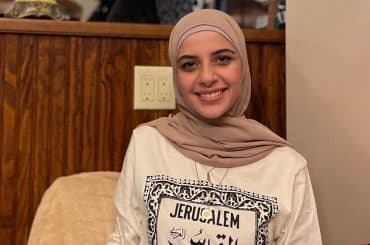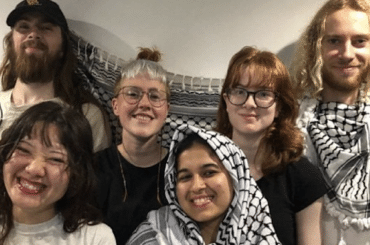At Indiana University’s undergraduate commencement on May 4, IU President Pamela Whitten assured the 9000 graduates in attendance that, through their education at IU, they were now “prepared”. Whitten almost certainly missed the irony in her remark. The fact was that for a few hundred students, including around 20 of those graduates, she had personally “prepared” them for the real world by showing them how a powerful institution like IU may repond with unprovoked violence when challenged over its complicity in injustice.
Ten days earlier, on the night before pro-Palestinian students, members of the IU Divestment Coalition, planned to set up a Gaza solidarity encampment on IU’s designated free speech area, Dunn Meadow, Whitten and her staff had convened a secret adhoc committee to rewrite IU’s long-standing policy governing the area. The next day, the newly formed encampment, dubbed the Liberation Zone, was met with heavily armed state police including snipers poised on top of the nearby student union building, before the students had spent a single night in the Meadow. Even those who had become used to Whitten’s arbitrary decisions were shocked. The 33 students and faculty arrested that day at the encampment were banned from campus for year.
But the Liberation Zone reformed. Two days later, Whitten ordered in the state police again, this time targeting particular students for arrest. Again, those arrested, now totalling 57, were banned from campus, in the case of the best-known of the student organizers (and the only African American among those arrested) for five years.
Once again, in spite of the university’s violent response, the Liberation Zone endured. It was still there a week later on the day of IU’s commencement, complete with rallies, art builds, teach-ins, hot meals, film showings, and wooden shields the students had fashioned to defend themselves in case of another attack by the police. Among the graduates at IU’s commencement ceremony were students who had participated in and sustained the encampment. They heard Whitten and the other speakers exhort the graduates to “dream big”, to “set great expectations for yourself”, to “be a risk-taker”, and to “make our Hoosier nation proud”, vacuous speeches that made ChatGPT look good, speeches that carefully avoided any mention of the issues of the day, in particular anything about the horrendous crimes being committed 6000 miles away, enabled by the tax dollars of the people in that audience.
The graduates listened as, one after the other, the speakers heaped praise on the university that had supposedly prepared them to “shape societal change” and exhorted them to stay connected with it (because IU will rely on their donations as alumni). Missing was any mention of IU’s relationship with the nearby Crane Naval Weapons Station and its link to Israel’s war on the Palestinian people, any mention of how IU had suspended a pro-Palestinian professor over a clerical error made filling out a form, any mention of how IU had canceled the exhibit of a distinguished Palestinian artist and IU alumna, any mention of how IU has become famous within the world of higher education, not for the quality of its teaching or research, but for cracking down on dissent.
Fortunately not everything proceeded as planned. If you were listening to the livestream of the commencement, you could hear the boos from the audience as Whitten spoke. If you were nearby, you would have seen the giant Palestinian flag and the banner reading “Let Gaza live”, pulled by a plane flying overhead, and the protesting faculty lined up on the street. If you were inside the stadium, you also would have seen the students from the encampment walking out of the stadium as they chanted “Free Palestine!” (This action was carefully covered up in the livestream by a hasty cut to a slick advertisement for IU.)
And if you were lucky, you would have heard about a very different commencement ceremony earlier that day, one organized by the students at the Liberation Zone itself. One of the Divestment Coalition members described the motivation for their Liberation Commencement as follows.
The IU Divestment Coalition stood firmly against IU’s commencement. IU is an institution complicit in and actively taking part in the genocide of the Palestinian people. Through its $111 million partnership with NSWC Crane, ignoring Palestinian voices on campus, and violent suppression of pro-Palestine activists, IU has actively fueled and manufactured support for genocide in Gaza. Attending IU’s graduation ceremony would give further legitimacy to its support for the Zionist settler colonial project. In contrast to IU’s commencement, the Liberation Commencement held at the encampment not only recognized graduates who are steadfast in their commitment to Palestinian liberation, but more importantly, recognized the more than 35,000 martyred Palestinians, more than 1.9 million displaced Palestinians, and all the students in Gaza who do not have the privilege of having a graduation. Through speeches, painting the Palestinian flag with our hands, and planting poppy seeds, we shifted the focus away from IU’s insensitive celebration and towards the immeasurable suffering in Gaza, our demands for divestment, and an end to the genocide in Palestine.
The Liberation Commencement was attended by 25+ graduates, their family members, supportive faculty, other encampment members, and supporters from the community. After each graduate’s name was announced, they dipped their hands in red, green, or black paint and added their handprint to an emerging Palestinian flag. The participants were later given poppy seeds to plant.
The speakers at the Liberation Commencement included the student suspended from campus for five years (speaking from the sidewalk above the encampment, technically city property), Bryce Greene; one of the graduates, Kemal Perdana; and four faculty members, including the professor suspended by the IU administration, Abdulkader Sinno, and two professors who were arrested in the first sweep of the encampment, Barbara Dennis and Ben Robinson. The contrast between their speeches and those at the “official” commencement later that day could not be more striking.
The Liberation Commencement speakers contrasted the graduation celebration of the IU students with the situation in Gaza, where there will be no commencement following the Israeli “scholasticide,” the systematic destruction of all of Gaza’s universities and the murder of hundreds of its teachers. Perdana recalled a quote from the martyred Palestinian poet Refaat Alareer, “Why would Israel bomb a university? [because] Knowledge is Israel’s worst enemy.” Perdana challenged the students at the encampment to take the knowledge they had of the ongoing genocide to “educate, agitate, organize,” to avoid selling out as they moved into the workforce, to continue their support for Palestinian liberation.
Beyond knowledge, the speakers challenged us to think of an expanded, activist, liberatory view of education. Dennis quoted from Edward Said: “Nothing is more reprehensible than those habits of mind in the intellectual that induce avoidance, that characteristic turning away from a difficult and principled position, which you know to be the right one.” In Dennis’s words, “what you have accomplished here in the Liberated Zone aligns with the Palestinian belief that education is liberation.” While praising the students for the academic achievements that were the focus of the other commencement, Robinson noted that the graduates assembled there had “made a connection between what you have learned about the truth and the world where that truth matters,” and instead of taking the easy way out in their final weeks at IU, had come to Dunn Meadow to say “to all those who wield truncheons against a people: that their violence, their apartheid, their occupation, will not stand.”
Finally, the speakers stressed the significance of the IU encampment itself and others like it around the world and the inspiration they drew from the Palestinians resisting occupation and ethnic cleansing. Robinson called on the attendees to “celebrate every life being lived in Gaza…[to] demonstrate our determination that those lives will draw strength from our stand just as we’ve drawn strength from their courage.” Clearly it is because this movement represents a threat to the genocidal Zionist project that university presidents like Whitten have responded with violence to the peaceful encampments, that governments around the world are criminalizing protest on behalf of Palestine.
Although commencement ceremonies are constrained in many ways, universities do have options, especially with regards to who speaks, so it is not hard to read between the lines and view these ceremonies as a reflection of how university administrations view education and its relationship to the world. From the empty exhortations to “create the future” and “channel your creativity and knowledge” and the avoidance of anything controversial at IU’s commencement, we learn that education is being viewed as disconnected from reality, a path to a job and nothing more. From USC’s cancellation of the commencement speech of its valedictorian, Asna Tabassum, because of the pro-Palestinian content on her Instagram account, we learn that that university feared that she would link the education the graduates had received to activism or link the university itself to Israel’s onslaught on Gaza.
But, as we saw at IU, there is a limit to the control the authorities have over the ceremony itself. Following IU’s commencent on May 4, commencements at other universities, including the University of Michigan, Virginia Commonwealth University, Pitzer College, UC Berkeley, and Duke University, were disrupted over the universities’ complicity or invited speakers who supported Israel’s policies. And, following backlash at the cancellation of the valedictorian’s speech, USC decided to cancel its main commencement altogether.
Thanks to this generation of students, with their encampments and their disruptions of “education as usual”, we’re forced to see the mainstream rituals as embodying a santitized, disengaged, corporate view of education. Inspired by IU’s Liberation Commencement, we should be celebrating the students’ brave commitment to fighting powerful institutions and their involvement in the Issue of Our Time, Zionism and the Palestinian genocide.



Yesterday I was at a rally at the University of Toronto’s pro-Palestine encampment. (One of the speakers was a Jewish grad student who was brought up in the Zionist bubble.) And I thought: What might have happened if there were demonstrations like this after Kristallnacht? Would Hitler, like Netanyahu, have said We’ll go it alone?
The Force is strong with the Lobby:
https://thehill.com/homenews/education/4680598-harvard-board-bars-13-pro-palestine-student-protesters-from-graduating-overruling-faculty/